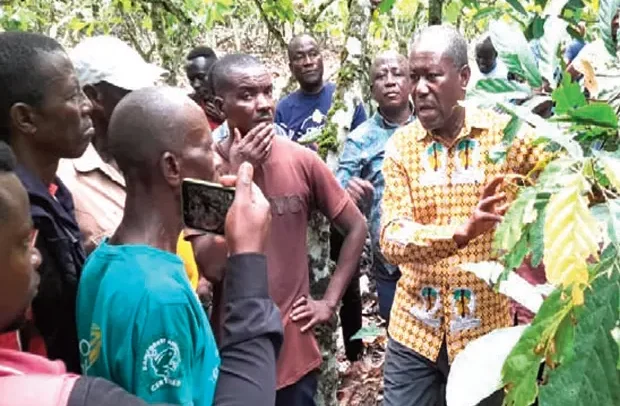Joseph Boahen Aidoo interacting with some farmers at Sienchiem in the Central Region
The Government has secured $100 million from the World Bank to rehabilitate overaged and unproductive cocoa farms to help improve cocoa production and livelihoods of farmers.
The Chief Executive of Ghana Cocoa Board (COCOBOD), Joseph Boahen Aidoo, revealed this to journalists during a field tour to some cocoa farms in Assin Fosu, Central Region, stating that rehabilitation work would be provided in six districts of Ghana.
“This intervention is definitely going to increase Ghana’s cocoa production. It is expected that by this intervention we are going to have young cocoa trees by the next two years,” he stated.
Mr. Aidoo remarked that it was unfortunate that some farmers were maintaining cocoa trees that did not have pods or blossoms, and that they used weedicides but received nothing in return, leaving them in poverty.
According to him, the government, with support from the World Bank, has intervened to get these moribund cocoa farms restored.
He highlighted Assin Fosu, Nkawkaw, New Edubiase, and Juaso as some of the districts that will benefit from the cocoa rehabilitation programme.
The COCOBOD CEO stated that, while the rehabilitation would be done in phases as part of the agreement, all relevant requirements have been met to allow the government to access the funds so that work can begin in earnest.
Some of the places visited by the COCOBOD boss include Swedru, Nyarkrom, Ejumako, Siechiem, Assin Fosu and Fosu Adiembra.
During the visit, Mr. Aidoo educated farmers in communities such as Jacobu, Armah, and Sampreku on good management methods to assist in increasing cocoa production.
He also educated the farmers about the importance of adopting appropriate farming methods such as pruning and regularly checking the soil fertility of their farmlands in order to boost yield.
According to him, most farmers could have produced more cocoa pods if they had followed fundamental farming practices.
Several interactive sessions were also held in the communities to explore the main challenges confronting the cocoa sector and what initiatives cocoa farmers may take to assist the government in increasing production.
Mr. Aidoo, who met with the Gomoa Man Cocoa Farmers Union at Gomoa Afransie, praised the farmers for their contributions to the country over the years, despite facing sometimes difficult conditions that resulted in lower yields.
He stated that the government has implemented measures throughout the years to ensure that cocoa cultivation continues to generate cash not only for them but also for the country’s economic development.
That, he explained to them, was also one of the reasons why the producer price of cocoa has consistently been raised for the benefit of farmers, despite fluctuating market prices and smuggling impeding the government’s efforts to meet production targets.
He urged the farmers to sell cocoa beans through accredited institutions rather than using individuals whose only purpose is to sell and smuggle them to neighbouring countries.
Farmers praised COCOBOD personnel, particularly the Chief Executive, for the visit and asked him to help improve road access to their farms while also requesting that the government raise the cocoa producer price.
Mr. Aidoo responded by assuring farmers of the government’s continuous commitment to providing them with the essential farm supplies to enhance their crops and sustain their livelihoods.
By Ebenezer K. Amponsah


